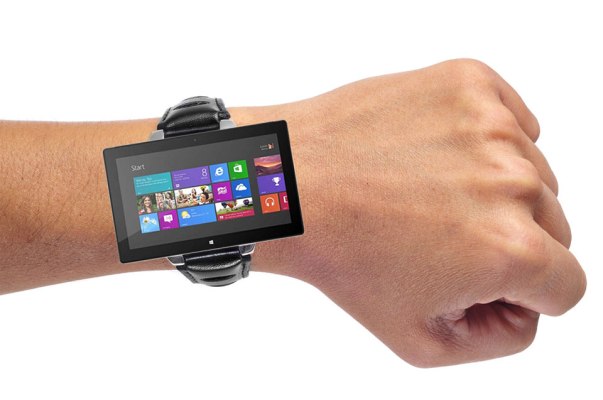Apple, Google, LG, and Samsung are all reportedly working on wrist-worn computing devices behind closed doors, and it seems like that little club of big companies may soon get another member. If a new report from the Wall Street Journal is to be believed, Microsoft has been in touch with an undisclosed number of suppliers who have apparently been tasked with delivering components for a smartwatch-like device that supports touch input.
Now that’s not to say that such a Microsoft smartwatch is a done deal just yet. The Journal’s sources couldn’t confirm that it would ever actually see the light of day, and I’d wager that’s because the folks in Redmond aren’t exactly sure themselves. After all, some of the company’s most intriguing potential products died ignominious deaths after being stuck in the research and production pipeline. Remember the Courier? The curious dual-screen tablet was apparently very far along (according to CNET, an employee who worked on Courier said it could’ve been completed in “months”) before Microsoft announced its demise in 2010.
It doesn’t help that the nascent smartwatch market has proven to be a tough one to crack. After all, the prospect of delivering a compelling user experience on a wrist-worn gadget isn’t a new one, and only a few of those devices (like the Pebble) could be considered anything close to successful.
Microsoft knows this all too well — the Redmond-based company debuted its SPOT (“Smart Personal Objects Technology”) data delivery service back at CES 2003, and it wasn’t long before watchmakers like Fossil, Suunto, and Tissot began folding SPOT into their own timepieces. Microsoft toyed around with at least one SPOT watch concept of its own, but as a company that was devoted largely to its software endeavors, it seemed more than happy to leave the finicky business of building watches to others before ultimately killing SPOT in 2008.
That’s not exactly the Microsoft we know today though. Early, fruitful hardware projects like the XBox and its successful successor have paved the way for a Microsoft that’s much more willing to take calculated chances on hardware. One could argue that devices like the Zune and Surface/Surface Pro tablets are more reactions to shifts in the consumer tech industry rather than game-changing innovations in their own right, but that’s not necessarily a problem when it comes to mass market gadgetry. The winner isn’t usually the company that does things first, it’s the company that does things best. For all we know, Microsoft could be the company best equipped to take the smartwatch concept and bring it to the masses, but we’ll have to wait and see if Redmond actually rises to that particular challenge first.
